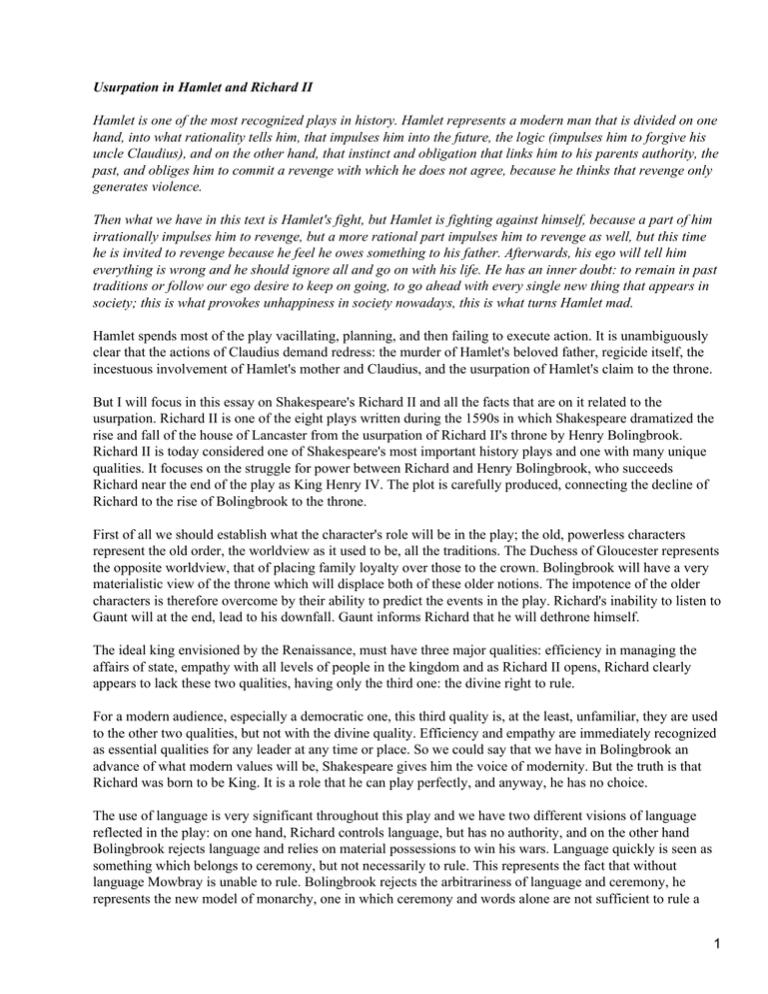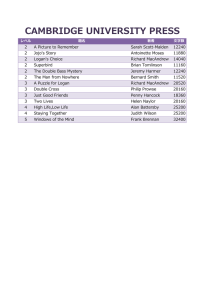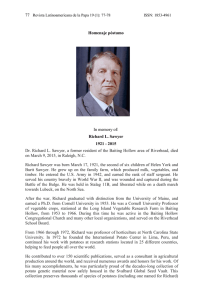Hamlet. Ricard II; William Shakespeare
Anuncio

Usurpation in Hamlet and Richard II Hamlet is one of the most recognized plays in history. Hamlet represents a modern man that is divided on one hand, into what rationality tells him, that impulses him into the future, the logic (impulses him to forgive his uncle Claudius), and on the other hand, that instinct and obligation that links him to his parents authority, the past, and obliges him to commit a revenge with which he does not agree, because he thinks that revenge only generates violence. Then what we have in this text is Hamlet's fight, but Hamlet is fighting against himself, because a part of him irrationally impulses him to revenge, but a more rational part impulses him to revenge as well, but this time he is invited to revenge because he feel he owes something to his father. Afterwards, his ego will tell him everything is wrong and he should ignore all and go on with his life. He has an inner doubt: to remain in past traditions or follow our ego desire to keep on going, to go ahead with every single new thing that appears in society; this is what provokes unhappiness in society nowadays, this is what turns Hamlet mad. Hamlet spends most of the play vacillating, planning, and then failing to execute action. It is unambiguously clear that the actions of Claudius demand redress: the murder of Hamlet's beloved father, regicide itself, the incestuous involvement of Hamlet's mother and Claudius, and the usurpation of Hamlet's claim to the throne. But I will focus in this essay on Shakespeare's Richard II and all the facts that are on it related to the usurpation. Richard II is one of the eight plays written during the 1590s in which Shakespeare dramatized the rise and fall of the house of Lancaster from the usurpation of Richard II's throne by Henry Bolingbrook. Richard II is today considered one of Shakespeare's most important history plays and one with many unique qualities. It focuses on the struggle for power between Richard and Henry Bolingbrook, who succeeds Richard near the end of the play as King Henry IV. The plot is carefully produced, connecting the decline of Richard to the rise of Bolingbrook to the throne. First of all we should establish what the character's role will be in the play; the old, powerless characters represent the old order, the worldview as it used to be, all the traditions. The Duchess of Gloucester represents the opposite worldview, that of placing family loyalty over those to the crown. Bolingbrook will have a very materialistic view of the throne which will displace both of these older notions. The impotence of the older characters is therefore overcome by their ability to predict the events in the play. Richard's inability to listen to Gaunt will at the end, lead to his downfall. Gaunt informs Richard that he will dethrone himself. The ideal king envisioned by the Renaissance, must have three major qualities: efficiency in managing the affairs of state, empathy with all levels of people in the kingdom and as Richard II opens, Richard clearly appears to lack these two qualities, having only the third one: the divine right to rule. For a modern audience, especially a democratic one, this third quality is, at the least, unfamiliar, they are used to the other two qualities, but not with the divine quality. Efficiency and empathy are immediately recognized as essential qualities for any leader at any time or place. So we could say that we have in Bolingbrook an advance of what modern values will be, Shakespeare gives him the voice of modernity. But the truth is that Richard was born to be King. It is a role that he can play perfectly, and anyway, he has no choice. The use of language is very significant throughout this play and we have two different visions of language reflected in the play: on one hand, Richard controls language, but has no authority, and on the other hand Bolingbrook rejects language and relies on material possessions to win his wars. Language quickly is seen as something which belongs to ceremony, but not necessarily to rule. This represents the fact that without language Mowbray is unable to rule. Bolingbrook rejects the arbitrariness of language and ceremony, he represents the new model of monarchy, one in which ceremony and words alone are not sufficient to rule a 1 country, he represents a modern monarch, breaks with all traditions. Richard II has in it the traditional aspect of the fallen hero. The act of descending for Bolingbrook is telling us what will happen afterwards, since later in the play Richard will literally be forced to descend the throne for Bolingbrook, who will ascend it. While the play focuses on Richard's descent, it also serves to illustrate Bolingbrook's ascent. For Richard such descent to the common people would be unthinkable, but for Bolingbrook it is a very good advance in his way to the throne. Bolingbrook gradually becomes more eloquent as the play progresses, he is acquiring that necessary attribute as he is going to be king. This will emerge even more strongly once Bolingbrook becomes Henry IV, at which point language and ceremony, that at a first time were rejected by him, will become essential to his ability to rule. In Richard II, the concept of usurpation is illustrated in a political sense by a character substituting himself as ruler. The sun has in the play a symbolic meaning, the sun represents the emblem of the King of England, and therefore this is a direct allusion to the fact that Richard will presently lose the throne. Richard's descent is being produce slowly and it seems it will be definitely. When he arrives to Wales we found another symbolical image: when he touches the ground of Wales, this image of the king brought down to the ground is reinforced when Richard is informed that the Welsh army has returned home. It is in this scene where he realizes that he cannot defeat Bolingbrook, but rather must surrender, he is now completely alone to finish his tragic fall. We are given two views of what it means to be a king throughout the play. Most notable is Richard's version, which relies on divine right and the fact that he is God's elected official. And the use of a name is precisely what leads to Richard's downfall. Bolingbrook has no pretensions that a name, is sufficient allow a man to rule. He believes in using materials and men to defend his name. As the play goes on, Richard compares himself more and more to Christ. This comparison is strengthened by the fact that Richard only fights with his words, not with his weapons. The fact that Richard is increasingly identified with the betrayed Christ, lead our reactions to Bolingbrook and to Richard to be more complex and ambiguous than this political orthodoxy would lead us to expect. Richard finally loses the sun, which now shines on Bolingbrook, the next king. This lost of the sun is symbolically representing the lost of the throne. Bolingbrook has stolen the sun, this will be the usurpation of the throne and now Richard, like the sun, will soon burn away. Richard, that now has no power nor properties, can maintain what Bolingbrook never had, his use and control of language and ceremony. The scene with two hands on the crown, two men holding the same crown, symbolically represents the fact that with the usurpation of the throne Bolingbrook will split England in what will lead to the War of the Roses. Richard's use of language becomes even more brilliant, for when he is asked if he will yield the throne, he says he can give up the throne but afterwards it is impossible for him to do so, it is impossible for him to ever yield the throne to another man. Richard for the first time abandons language in this final act. Throughout the play he has not fought with anyone, preferring instead to defend himself with language, but here he becomes the aggressor, succeeding in killing two men before being killed himself. This change in Richard, from using language to war and violence, comes too late for him, maybe if he had chosen to fight earlier, history might have been different. Did Richard freely abdicate, or was he forced? Is Bolingbrook the legal king or an usurper? Bolingbrook's claim to the throne will be legitimate only if Richard willingly abdicates; otherwise the divine right of kings would be violated. The death of Richard puts Henry IV in the same position Richard was in at the beginning, as long as Richard was alive he could say that Richard had ceded the power to rule over to him, but the true is 2 that Richard is death and this is no longer possible. Now Henry must defend against the same accusations Richard had to face. Was Shakespeare in the play necessarily condemning the defeat of Richard, or treating it as a usurpation? Richard displays two kinds of usurpation in the play: first, he reduces Mowbray and Bolingbrook to travellers, absolving them of their rights as Dukes in England. Afterwards, Richard takes John of Gaunt's land and wealth to finance a war with Scotland; clearly he does not hesitate to abuse his power as king. In doing this, he takes Henry's name from him: Henry is no longer the Duke of Herford or Lancaster. Without his titles and inheritance, Henry is left powerless and virtually insignificant in society; but Henry is hardly a powerless character. Henry returns to England, disregarding his term of expulsion determined by Richard. It appears as though Henry does not regard the King's authority, and is challenging Richard's power. Displaying a second type of usurpation, Henry utilizes the northern lords of England, in his rebellion. This united effort forces Richard to realize the futility of fighting Henry. Richard may have the crown, but Henry displays psychological power over Richard. Henry does not consider Richard the King and more over, Richard's failure is public, not just political, which adds to his humiliation. The character of Richard has fallen so completely that he is given no liberties. The cultural and psychological instances of usurpation in this play appear more frequently than usurpation in the political sense. The most common kind of usurpation is a character imposing on another character's rights, which creates a conflict in the play; this also contributed to characterization, as did unauthorized assertions and unjustified assumptions. The common social trend of usurpation is that the perpetrators are more often high characters, such as Richard. Regarding the act of usurping, it appears that the greater the risk, the more excited characters are: Henry shows no qualms about deceiving Richard. Usurpation appears to be a serious concern of Shakespeare's in this play. Furthermore, Henry and Richard switch roles as the perpetrator and the victim of usurpation. 1 3

